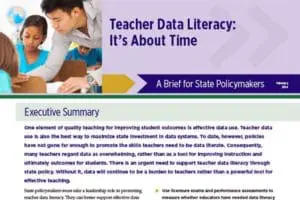Teachers are caught in a deluge of data—but they shouldn’t be. All states have built robust education data systems, but most teachers aren’t trained in how to use the data and aren’t given the time and tools to do so effectively. Many teachers feel like they’re “drowning in data.” This is not the Data Quality Campaign’s (or anybody’s) idea of effective data use. Regardless of how much data you have, it doesn’t matter if it is not the data your teachers need or if your teachers aren’t properly positioned to use that data to help kids. With this in mind, DQC worked in partnership with two dozen other organizations over the past year to figure out what it looks like when teachers have the knowledge, skills, and capacity to use data to support student success.
The resulting definition says data literate educators continuously, effectively, and ethically access, interpret, act on, and communicate multiple types of data from state, local, classroom, and other sources in order to improve outcomes for students in a manner appropriate to their professional roles and responsibilities.
Today, DQC and a subset of these partner organizations release a new paper at a national event of education rock stars that is a call to action to create the programs and policies needed to foster a culture in which all educators are data literate.
In promoting this transformation, we must be clear about what data are and are not. Data are not the end of the conversation, or even a teachers’ primary tool. Data make up one crucial tool (along with pedagogy, classroom observations, curriculum, etc.) that allow teachers—and those who support them, like principals and superintendents—to dig deeper, personalize learning, and improve student experiences and outcomes in a number of other ways.
And data need to be used throughout conversations about teaching and learning. Effective data use does not mean putting the data on a shelf until someone asks for it for compliance or accountability purposes. It means knowing which data are appropriate to use under the circumstances—and how—to answer questions that lead to student improvement. That’s the difference between data deluge and data literacy, between frustrating teachers and empowering teachers with data.
We’ve created systems and policies to support data use, but they aren’t going to work without also creating policies that support teacher data literacy. Policymakers cannot mandate culture, but they can help change it through supportive polices, like teacher certification and licensure requiring data literacy and incentives for teachers to use time productively. Delaware, for example, has created incentives for every district in the state to carve out 90 minutes a week for educators to meet in professional learning communities for conversation around data. It’s also funded data coaches to help guide educators in data-based discussions.
Unfortunately when most people hear data, they still hear test scores—especially scores on big, standardized assessments used primarily for accountability. This needs to change if we are to create a culture that’s truly using data to improve student success. Yes, assessments of all types yield data for different purposes, but those data provide just a glimpse of the big picture. Teachers need access to other types of data and powerful tools, like early warning systems (comprising attendance and course grade data), that go further than summative test scores in providing a picture of student needs. As DQC’s favorite mantra goes, data should be used as a flashlight, not just a hammer.
Finally, the urgency to create a data-literate educator workforce goes hand in hand with concerns about data privacy and security. Teachers need to trust that they are using high-quality data, and that they have the skills and expertise to use information ethically and appropriately. Teachers also need to understand that they are critical players in safeguarding data; that means they need to be trained on data privacy and security policies and best practices and, like everyone with access to data, be accountable for protecting their students’ personally identifiable information. Educators confident in this area will be able to put data to their best uses while building trust that they will be kept safe.
Teachers cannot become data literate in a vacuum. Principals, superintendents, school boards, and others will need to support practices that enable data literacy (such as time during the school day to talk about data with other teachers and high-quality professional development) and be data literate themselves to model behavior and drive culture. With strong leadership from policymakers and school officials to change policy and practice, we can empower our educators with useful, trustworthy, high-quality data—a tool too powerful to leave on the shelf.


